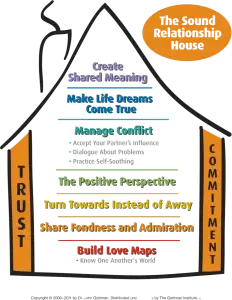Debunking Myths about Relationship Therapy for Diverse Couples
Many couples hesitate to try relationship therapy because of common myths that don’t fit their unique situation. If you’re part of a diverse couple—whether monogamous, polyamorous, 2SLGBTQIA+, ENM, or part of the BDSM & Kink community—you might feel therapy isn’t designed for you. Let’s clear up those misunderstandings and show how expert relationship guidance, using proven approaches like the Gottman Method and Emotionally Focused Therapy, can support your connection. Learn more about debunking myths in relationship therapy here.
Understanding Therapy Myths

Many people have misconceptions about relationship therapy. Let’s explore these myths and reveal the truth behind them.
Common Misconceptions
Have you ever thought therapy is only for couples on the brink of breaking up? That’s just one of many myths out there. Most people think therapy is a last resort, but it can be a proactive step to strengthen your bond. Did you know: Over 50% of couples in therapy report improved communication skills. Therapy isn’t just about fixing problems; it’s about enhancing your connection. Read more about common myths here.
Another misconception is that therapy is only for certain kinds of couples. But whether you’re monogamous, polyamorous, or part of the 2SLGBTQIA+ community, therapy can be customized to suit your needs. You might think your relationship isn’t “typical” enough for therapy, but that’s not true. Therapy is adaptable and inclusive, designed to meet the diverse needs of all couples.
Therapy for Diverse Couples
Have you ever wondered if therapy considers your unique relationship dynamics? The truth is, therapy is flexible and can support various relationship types. If you’re part of the BDSM & Kink community, you might worry therapists won’t understand your lifestyle. But many therapists are equipped to provide nonjudgmental support.
Diverse couples often face unique challenges. Whether you’re exploring non-monogamy or navigating the dynamics of a polyamorous relationship, therapy can provide a safe space to discuss your feelings. Therapy is about understanding and accepting your relationship dynamics, fostering communication, and building stronger bonds.
Expert Guidance Benefits
Seeking help from an expert can transform your relationship. Therapy offers a space to address misunderstandings and build trust. Imagine having a guide who listens without judgment and helps you navigate complex emotions. Most people think therapy is only about talking, but it’s also about listening and connecting on a deeper level.
Therapists trained in the Gottman Method or Emotionally Focused Therapy provide guidance that’s rooted in research. This expertise allows you to tackle issues with proven strategies. Your relationship deserves the best care, and expert guidance ensures you’re on the right path. Check out more on the benefits of expert guidance here.
Proven Therapeutic Methods

Understanding proven methods can change your perspective on therapy. Let’s delve into two effective approaches that have helped countless couples.
The Gottman Method Explained
The Gottman Method is a research-based approach that focuses on improving communication and intimacy. Developed over decades, it provides practical tools to manage conflict and increase affection. Imagine a toolbox of strategies tailored to your relationship’s needs.
This method emphasizes understanding your partner’s perspective and building mutual respect. It includes exercises to strengthen your friendship and enhance your emotional connection. With over 40 years of research backing it, the Gottman Method is a reliable way to enhance your relationship. Discover more about this method here.
Emotionally Focused Therapy Benefits
Emotionally Focused Therapy (EFT) centers on emotional bonding and attachment. It’s about understanding your emotional responses and using them to strengthen your connection. EFT helps you identify negative patterns and transform them into positive interactions.
This method is effective for couples facing emotional distance or trust issues. By focusing on emotions, EFT creates a safe space to express fears and needs. When you understand your partner’s emotions, you can connect on a deeper level, fostering a lasting bond. Learn more about EFT here.
Tailored Support for All Relationships

Therapy should meet your unique needs. Let’s explore how personalized support benefits various relationship types.
Monogamous and Polyamorous Couples
Monogamous couples often seek therapy for communication issues or trust building. But what about polyamorous relationships? Therapy can help navigate complexities like shared responsibilities and emotional boundaries. Here’s the insight: Both relationship types can benefit from therapy’s structured guidance.
For monogamous couples, therapy offers tools to enhance intimacy and resolve conflicts. Polyamorous couples can explore emotional challenges and establish healthy boundaries. Therapy isn’t one-size-fits-all; it’s customized to fit your relationship dynamics.
2SLGBTQIA+, ENM, BDSM & Kink Therapy
Therapy should feel inclusive and accepting. If you’re part of the 2SLGBTQIA+ community, you might worry about finding a supportive therapist. But therapy is a space to explore your identity without judgment. Did you know: Many therapists are trained to support diverse sexual and gender identities?
For those in ENM or the BDSM & Kink communities, therapy offers a nonjudgmental space to discuss unique challenges. Whether you’re navigating multiple partners or exploring power dynamics, therapy supports your journey. It’s about understanding your needs and fostering acceptance.
Virtual and In-Person Flexibility
Therapy should fit into your life. Whether you prefer in-person sessions or the convenience of virtual therapy, options are available. Imagine accessing expert guidance from the comfort of your home. Virtual therapy offers flexibility, making it easier to prioritize your relationship.
Both virtual and in-person therapy provide the same level of care and support. It’s about what works best for you and your partner. The longer you wait, the more challenges can grow. Embrace the flexibility and start your therapy journey today.
In summary, relationship therapy isn’t just for couples in crisis. It’s a valuable tool for enhancing connections, tailored to fit diverse needs. By understanding myths, exploring proven methods, and embracing personalized support, you’re empowered to strengthen your relationship.




